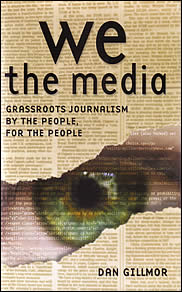 Compré este libro como parte el proceso de documentación para mi charla en Granada -que se titulaba, por cierto, «La locura del método». No llegó a tiempo, así que no incluí nada. Pero leyendo la introducción, encuentro curiosas coincidencias de pensamiento (por ejemplo, Dan Gillmor parece opinar, como yo, que no estamos haciendo nada fundamentalmente nuevo, sino que lo hacemos de otra forma) por lo que creo que la lectura va a ser muy interesante.
Compré este libro como parte el proceso de documentación para mi charla en Granada -que se titulaba, por cierto, «La locura del método». No llegó a tiempo, así que no incluí nada. Pero leyendo la introducción, encuentro curiosas coincidencias de pensamiento (por ejemplo, Dan Gillmor parece opinar, como yo, que no estamos haciendo nada fundamentalmente nuevo, sino que lo hacemos de otra forma) por lo que creo que la lectura va a ser muy interesante.
De la contraportada:
Big Media has lost its monopoly on the news, thanks to the Internet. Now that it’s possible to publish in real time to a worldwide audience, a new breed of grassroots journalists are taking the news into their own hands. Armed with laptops, cell phones, and digital cameras, these readers-turned-reporters are transforming the news from a lecture into a conversation. In We the Media, nationally acclaimed newspaper columnist and blogger Dan Gillmor tells the story of this emerging phenomenon and sheds light on this deep shift in how we make-and consume-the news.
Gillmor shows how anyone can produce the news, using personal web journals (called weblogs or blogs), Internet chat groups, and email. He sends a wake-up call to newsmakerspoliticians, business executives, celebrities and the marketers and PR flacks who promote them. He explains how to successfully play by the rules of this new era and shift from «control» to «engagement.» And he makes a strong case to his fellow journalists that, in the face of a plethora of Internet-fueled news vehicles, they must change or become irrelevant.
At its core, We the Media is a book about people. People such as Glenn Reynolds, a law professor whose blog postings on technology and liberty garnered him enough readers and influence that he became a source for professional journalists. Or Joe Trippi, who almost took Howard Dean to the presidential nomination using Net-enabled grassroots politics. Or Iraqi blogger Zayed, whose Healing Iraq blog scooped Big Media. Or «acridrabbit,» who inspired an online community to become investigative reporters and discover that sad tale of the dying Kaycee Nichols’ was a hoax. Give the people tools to make the news, Gillmor asserts, and they will.
Journalism in the 21st century will be fundamentally different from the Big Media that prevails today. We the Media casts light on the future of journalism, and invites us all to be part of it.






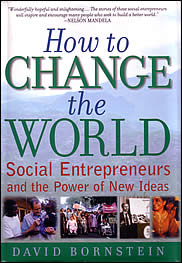 Escuché una
Escuché una  Compré este libro como parte el proceso de documentación para mi charla en Granada -que se titulaba, por cierto, «La locura del método». No llegó a tiempo, así que no incluí nada. Pero leyendo la introducción, encuentro curiosas coincidencias de pensamiento (por ejemplo, Dan Gillmor parece opinar, como yo, que no estamos haciendo nada fundamentalmente nuevo, sino que lo hacemos de otra forma) por lo que creo que la lectura va a ser muy interesante.
Compré este libro como parte el proceso de documentación para mi charla en Granada -que se titulaba, por cierto, «La locura del método». No llegó a tiempo, así que no incluí nada. Pero leyendo la introducción, encuentro curiosas coincidencias de pensamiento (por ejemplo, Dan Gillmor parece opinar, como yo, que no estamos haciendo nada fundamentalmente nuevo, sino que lo hacemos de otra forma) por lo que creo que la lectura va a ser muy interesante. No tengo muy claro por qué este libro de Thomas Paine estaba en el paquete que recibí. Sé que lo pedí, pero no consigo recordar la razón. Debí leer sobre él en algún blog de ateismo y pensé que sería interesante. Veremos cuando lo lea.
No tengo muy claro por qué este libro de Thomas Paine estaba en el paquete que recibí. Sé que lo pedí, pero no consigo recordar la razón. Debí leer sobre él en algún blog de ateismo y pensé que sería interesante. Veremos cuando lo lea.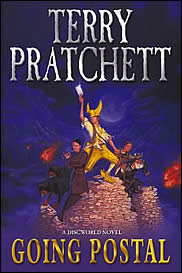 Me encantan los libros de Terry Pratchett. Lo considero un autor tan cómico que alcanza las más altas cotas de seriedad. Me faltan unos pocos de las serie del Mundodisco y algunos de la encarnación más juvenil (juveniles en edad, porque por lo demás parecen todavía más serios).
Me encantan los libros de Terry Pratchett. Lo considero un autor tan cómico que alcanza las más altas cotas de seriedad. Me faltan unos pocos de las serie del Mundodisco y algunos de la encarnación más juvenil (juveniles en edad, porque por lo demás parecen todavía más serios).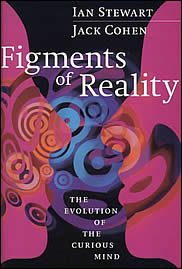 Ian Stewart y Jack Cohen son dos excelentes divulgadores (me gustan especialmente los libros sobre ciencia del Mundodisco que han escrito con Terry Pratchett).
Ian Stewart y Jack Cohen son dos excelentes divulgadores (me gustan especialmente los libros sobre ciencia del Mundodisco que han escrito con Terry Pratchett).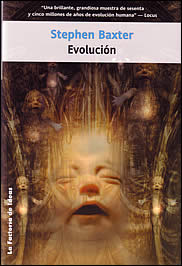 Hace tiempo leí mucho a Stephen Baxter. Un autor caracterizado por usar mucha ciencia en sus novelas.
Hace tiempo leí mucho a Stephen Baxter. Un autor caracterizado por usar mucha ciencia en sus novelas.